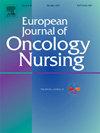支持癌症相关疲劳的自我管理:对护士顾问和癌症幸存者咨询的对话分析研究。
IF 2.7
3区 医学
Q1 NURSING
引用次数: 0
摘要
目的:癌症相关疲劳(CRF)是癌症患者普遍存在的一种痛苦症状。临床医生与患者之间的合作关系破裂以及临床医生沟通不畅被认为是在临床实践中实施有效的 CRF 自我管理策略的重大障碍。本研究考察了训练有素的癌症护士顾问在为癌症幸存者提供 CRF 自我管理支持时采用的沟通方法及其影响:方法:在澳大利亚昆士兰州的一家 CRF 自我管理支持诊所,记录了 3 名护士顾问与 23 名癌症幸存者之间的 41 次远程咨询互动,并使用对话分析方法对其进行了分析:分析发现,如果护士在会话一开始就确定了咨询议程(例如,重点关注疲劳自我管理支持),癌症幸存者对其自我管理角色、任务和会话目标的理解就会更加清晰,参与支持性护理讨论的难度也会降低。此外,临床医生在咨询过程中使用了总结对话等表述方法,以保持对疲劳的关注,并结束表面上与疲劳自我管理规划无关的讨论,从而支持 CRF SMS 诊所咨询的目标:结论:对于以疲劳管理为目标的支持性护理会诊,临床医生最好能在会诊开始时明确介绍会诊议程,并征得患者同意,从而尽早将讨论重点放在 CRF 支持上。定期总结患者的谈话内容可使临床医生继续关注与自我管理疲劳计划相关的事项,并在通常分配给解决 CRF 问题的有限时间内提供支持。本文章由计算机程序翻译,如有差异,请以英文原文为准。
Supporting cancer-related fatigue self-management: A conversation analytic study of nurse counsellor and cancer survivor consultations
Purpose
Cancer-related fatigue (CRF) is a prevalent and distressing symptom experienced by people affected by cancer. A breakdown of the clinician-patient partnership and suboptimal clinician communication has been identified as a significant barrier to implementing into clinical practice effective self-management strategies for CRF. This study examined the use and impact of communication practices employed by trained cancer nurse counsellors when providing CRF self-management support to cancer survivors.
Methods
Interactions from 41 telehealth consultations between three nurse counsellors and 23 cancer survivors in a CRF self-management support clinic in Queensland, Australia were recorded and analysed using conversation analysis methods.
Results
Analysis found that in instances where nurses established the agenda of a consultation from the outset of a session (e.g., focusing on fatigue self-management support), cancer survivors displayed clearer understandings of their self-management role, the tasks, and goals of a session; and displayed less difficulty engaging in supportive care discussions. Furthermore, clinicians used formulation practices, such as summarising dialogue, to sustain focus on fatigue during consultations, and to close discussion matters not ostensibly pertinent to fatigue self-management planning supporting the goals of the CRF SMS clinic consultations.
Conclusion
For supportive care sessions targeting fatigue management, clinicians should ideally focus discussion on CRF support early, by clearly introducing the agenda at the outset of the consultation while also asking for client agreement. Periodically summarising patient's talk allows clinicians to maintain a focus on matters relevant for self-management fatigue planning and provide support within the typically constrained timeframes allocated for addressing CRF.
求助全文
通过发布文献求助,成功后即可免费获取论文全文。
去求助
来源期刊
CiteScore
4.40
自引率
3.60%
发文量
109
审稿时长
57 days
期刊介绍:
The European Journal of Oncology Nursing is an international journal which publishes research of direct relevance to patient care, nurse education, management and policy development. EJON is proud to be the official journal of the European Oncology Nursing Society.
The journal publishes the following types of papers:
• Original research articles
• Review articles

 求助内容:
求助内容: 应助结果提醒方式:
应助结果提醒方式:


